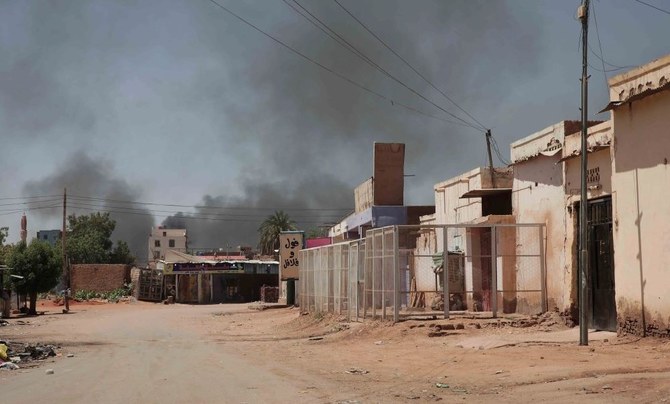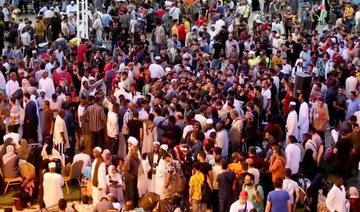PARIS: The Sudanese government will support any Saudi or US initiative to put an end to the violence in the country, Dr. Khaled Mohammed Farah, Sudan’s ambassador to France, has told Arab News en Francais in an interview.
Responsibility for the country’s descent into violence on April 15 lies with Rapid Support Forces (RSF) chief Mohamed Hamdan Dagalo, also known as Hemedti, Farah added, warning: “Sudan is a country targeted by enemies at the regional and international level.”
Fierce fighting broke out last month between the Sudanese Armed Forces, led by Gen. Abdel Fattah Al-Burhan, and the RSF, across 12 of the country’s 18 states, with the biggest clashes taking place in the capital, Khartoum.
The Sudanese government supports any African initiative to end the violence, “just as it champions any Saudi and American initiative,” Farah said.
When asked about the failure of two successive truce attempts, Farah held Hemedti responsible, saying: “Because he lost, he has been crushed and all his bases have been completely destroyed.”
He added that RSF soldiers “have scattered around neighborhoods where they have mingled with civilians, which complicates the mission of the army that is trying to hunt them down, making the operation more dangerous.”
With no end to the fighting in sight, Farah conceded that putting an end to hostilities “will take time,” but added that Sudanese authorities “have a clear position to say that priority should be given to regional organizations, such as the African Union and the Intergovernmental Authority on Development (IGAD), to try to find an African solution to an African problem.”
Therefore, the Sudanese government will support any African initiative, “just as it champions any Saudi and American initiative,” he said.
The Saudi position “is positive, and it is thanks to joint Saudi-US efforts that we have reached the three-day truce for the first time,” Farah added.
In the long term, the ambassador said that Saudi Arabia “can continue to play a constructive role, especially on the humanitarian level.
“Relations between our two countries have always been good. We have almost 1 million Sudanese nationals who work and live in Arabia and contribute to the Sudanese economy.”
France also “certainly has a role to play” in settling the situation in Sudan, the ambassador said, adding that he observed “a positive reaction” from the French, who can “use their influence in some countries in the region, such as Chad, to try to ease tensions.
For some analysts, the cause of the clashes, which have killed more than 600 and injured more than 5,000, lies in the rivalry between the two generals, while for others, it is an inevitable result of the gaping wounds in the history of the country, such as the ethnic war in Darfur in West Sudan.
But Farah said that the conflict is a result of the RSF “rising up against Sudan’s national army,” adding that the paramilitary had “attempted a coup against the national army to seize power.”
The RSF “oppose the will of an entire population and a whole nation,” he said, adding that the paramilitary is “constituted of mercenaries coming from foreign countries” though it “might be supported by members of the tribe of Hemedti, which is a small tribe from East Darfur.”
Another cause of the fighting, Farah said, was the “reform of the army, which consisted of dismantling it while replacing it with RSF on the grounds that it is not inclusive and is close to the Islamists, all of which are lies.”
Formerly recruited by former Sudanese president Omar Al-Bashir to lead the Janjaweed militia, Hemedti, a former camel trader, rose to prominence as a military leader and businessman.
His financing and weapons are connected to the Libyan National Army commander Khalifa Haftar, and the RSF mercenaries in question come unofficially, from neighboring countries, such as Chad or Niger, among others.
The RSF also has connections with some Arab countries, as well as with Russia and its notorious Wagner Group paramilitary.
Farah said that Hemedti lacks true popularity in Sudan.
“He is a fighter who has no ideology and who is not even educated. Al-Bashir paid to recruit him to counterbalance the weight of the army,” he said.
In 2013, Al-Bashir established the RSF by combining former Janjaweed units. Hemedti was promoted to general and took charge of the force, launching a major recruitment drive.
Today, the RSF employs more than 100,000 fighters, with Hemedti using his power to seize lucrative gold mines in Darfur and finance the paramilitary’s growth.
In 2021, he joined forces with Al-Burhan to oust the transitional government, composed of civilians and soldiers, which succeeded Al-Bashir, who was overthrown in 2019 by a popular uprising.
Al-Burhan and Hemedti governed together, but the simmering rivalry between the two generals exploded last month, with the Sudanese people paying the price.

























